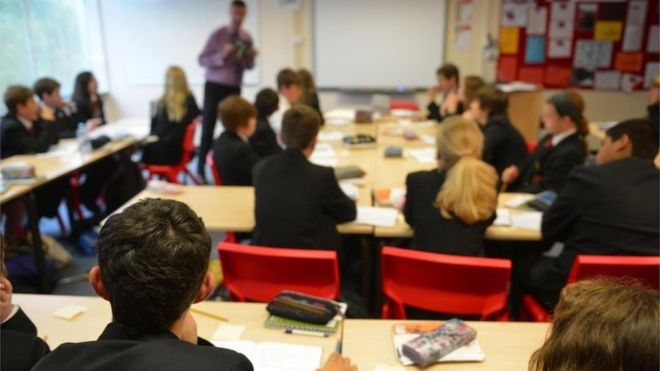
The government will take a “pragmatic” look at new grammar schools but will not be “going back to the past”, the education secretary has told MPs.
Justine Greening said she wanted to offer parents choice but children would not be split into “winners and losers”.
She was answering an urgent question after a document proposing new grammars was photographed outside No 10.
Labour said the government was showing a “dangerous misunderstanding” of issues facing schools in England.
Meanwhile, BBC Newsnight is reporting that a new green paper is expected to be presented on Friday and will propose opening new grammar schools and allowing further selection by faith.
BBC Newsnight’s policy editor Chris Cook said the most contentious suggestion in the consultation paper was likely to be that the government should pass legislation to permit new grammar schools. This would be required to overrule the 1998 Education Act, which barred the opening of further grammar schools in England.
To help overcome opposition in the Commons and the Lords, where the government does not have a majority, the paper is expected to propose that the schools should dedicate a quota of places to children from poorer backgrounds, Chris Cook said. Grammar schools may also be required to act as academy sponsors to other schools, he added.
Universities could also be asked to sponsor academies as a condition of being allowed to raise their fees. A similar condition may also be applied to private schools, Chris Cook said.
Earlier, answering an urgent question in the Commons, the education secretary said she recognised the debate over grammar schools was “emotive”, saying government plans would be set out “in due course”.
“There will be no return to the simplistic binary choice of the past where schools split children into winners and losers, successes and failures,” she promised.
Selection can “play a role” in the education system, she said, and while grammar schools can provide a “stretching, outstanding education”, they are only part of a “very broad-based school system”.
The forthcoming policy was “absolutely not about going back to the past”, she said.
Labour warned against creating more grammar schools, with shadow education secretary Angela Rayner saying such a policy would do nothing to address teaching staff shortages or “super-size” classes.
The debate over grammar schools was sparked after a document outlining proposals to open new ones was snapped by a photographer outside 10 Downing Street on Tuesday.
On Wednesday evening Prime Minister Theresa May told Conservative MPs she wanted “an element of selection” in the education system, but that new grammar schools would not be forced on areas that did not want them.
Addressing the 1922 committee of backbench MPs, the PM said “selection by house price” already existed within the state school system, with wealthier parents able to ensure a place for their children at high-performing schools by buying homes in the catchment area.
The government intends to publish its plans for school reform in the near future – according to the Daily Telegraph, the PM will publish a green paper and deliver a speech setting out her plans.
Grammar schools are state secondaries whose pupils are selected by examination at age 10 to 11.
- What are grammar schools?
There are currently about 163 grammar schools – out of 3,000 state secondaries – in England, and a further 69 in Northern Ireland.
Under a law created by the Labour government in 1998, no new grammar schools are allowed to open in England. Education policy is devolved in Scotland, Wales and Northern Ireland.
Supporters of grammar schools say that children from poor backgrounds are helped to make the most of their potential because entry to such schools is on the basis of raw ability.
But many argue that, in fact, the vast majority of those doing well in entrance tests are children whose parents have paid for them to be privately tutored outside school.
Analysis
Norman Smith, assistant political editor
Grammar schools remain a highly emotive political issue – but will form only one part of a much bigger package of school reform, that could include allowing free schools to introduce academic selection.
In an effort to overcome concern – including in her own party – that grammars are socially divisive, Mrs May will suggest they should only be set up where there is parental demand and priority would be given to less affluent areas.
Ministers also want the entry exams to be less susceptible to coaching and there may be different entry requirements for poorer pupils, and grammar schools would be expected to have close ties with local primary schools and to demonstrate they were socially inclusive and benefitted the local community.
Defence Secretary Michael Fallon, whose constituency of Sevenoaks, Kent, got approval for the first new “grammar school” – technically described as an annexe to an existing one – for five decades last year, told BBC Radio 4’s Today programme the government would “widen choice” but this would not mean children who failed entry exam going to “sink schools”.
Sir Michael Wilshaw, chief inspector of schools watchdog Ofsted, this week said the idea that poor children would benefit from a return of grammar schools was “tosh” and “nonsense”.
Former Lib Dem Deputy Prime Minister Nick Clegg told Today the government did not have a mandate to expand grammar schools, accusing it of “foisting their own evidence-free prejudices upon us”.
The government’s social mobility tsar, Alan Milburn, warned that a return to grammars could be “a social mobility disaster”, telling The Guardian: “This is not selection educationally, it is selection socially.”
The Conservative Party manifesto for 2015 promised to “allow all good schools to expand, whether they are maintained schools, academies, faith schools or grammar schools”.
Teaching unions attacked any expansion of grammar schools.
The National Union of Teachers described it as a “regressive move”, the Association of Teachers and Lecturers said it would be a “massive distraction” and the NASUWT said government policies had already increased “covert selection, often targeted at pupils from materially deprived backgrounds”.
The Association of School and College Leaders, which represents secondary heads, said increased selection was “education policy by nostalgia” that would not help social mobility.
[Source:- BBC]








